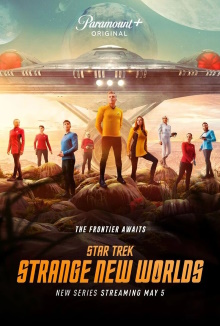Despite being a huge Star Trek fan, I’ve eschewed all of the newer live-action series and I’ve even decided to skip Picard because of how bad the reviews are and how people kept saying they’re not really Star Trek. I made an exception for Lower Decks which took the franchise in a different direction while still being in keeping with its spirit and now we have this series which is as pure original Star Trek as anyone could imagine. If anything this is a little too faithful as along with the idealism it also brings back a simplicity that is just too childish for my tastes these days. I enjoyed watching this season but I’m not sure I’m up for more.
This is a spin-off from the Discovery series that I never watched but that doesn’t much matter as I already know that the core premise is based on the pilot episode of the Star Trek Original Series. Here Captain Christopher Pike captains the USS Enterprise, with Una-Chin Riley, previously only known as Number One, as the second-in-command. Spock is Science Officer and Nyota Uhura is a cadet specializing in linguistics. The stories are episodic, reverting to the classical style of the ship visiting new places and meeting new people every time. Of course the crew members still have their long-running plot lines including Spock’s struggle between his human and Vulcan sides and his relationship with his fiancée T’Pring, Una secretly being a genetically modified Ilyrian and most importantly of all, Pike having already seen the future and knows how he will die as shown in the Original Series. The storylines are classic staples as well including intervening in pre-warp civilizations, encountering god-like beings and dealing with monstrous threats.
Together with its back to basics approach, this series adopts simpler, more straightforward storylines and unashamedly pure idealism. It’s actually so positive and sappy that it was too much for me even as a dedicated Star Trek fan, especially in the first few episodes. Fortunately the later episodes are a little more sophisticated. The characters never lose their idealism, but they’re forced to pay significant costs to defend their beliefs in terms of death and suffering and they don’t always get their way. Ten episodes in a season is what all modern shows must work with these days but it feels restrictive for Star Trek. This seems to have forced them to do just one episode in each of the classic molds: a homage to a famous science-fiction story, a horror story, a Holodeck episode without a Holodeck, a callback to a classic Original Series episode and so on. The writing is never particularly great but I did appreciate how it respects the fandom and never denigrates the characters and stories of previous shows. The finale is just fantastic, introducing James T. Kirk and portraying him as a captain who is very different from Pike and yet also a highly effective Starfleet officer.
So the question is whether a show like this is worth watching in the here and now. In terms of writing quality, seriousness, and even visual detail, this is far short of a modern show like The Expanse. It’s not even in the same ballpark. We can’t even say it presents fresh science-fiction ideas because its plot points are the classic ones from decades ago. It’s nice to include a story adapted from The Ones Who Walk Away from Omelas by Ursula K. Le Guin but every genre fan will already have read that one long ago. So in the end, what this show is really selling is niceness and nostalgic familiarity. It’s not bad in that regard and many fans do seem to love this back to basics approach. Quite a few have even developed a liking for this new crew and want to see what adventures they get up to next. For my part, I’m finding this too simple to be really appealing but it did seem to be getting better towards the end so I’ll have to wait to see what people say about future seasons.
More modern Star Trek shows have always had the problem that truly original science-fiction ideas are hard to come by. Many newer science-fiction shows are excellent in exploring ideas in specific niches such as Black Mirror and even Westworld, which the more general focus of Star Trek can’t match. Some writers compensate by subverting the idealism of the Federation but then that turns it into just another action or thriller show. It’s a tough balance to strike and I’m just not sure that it’s really possible to do so in the modern era.
